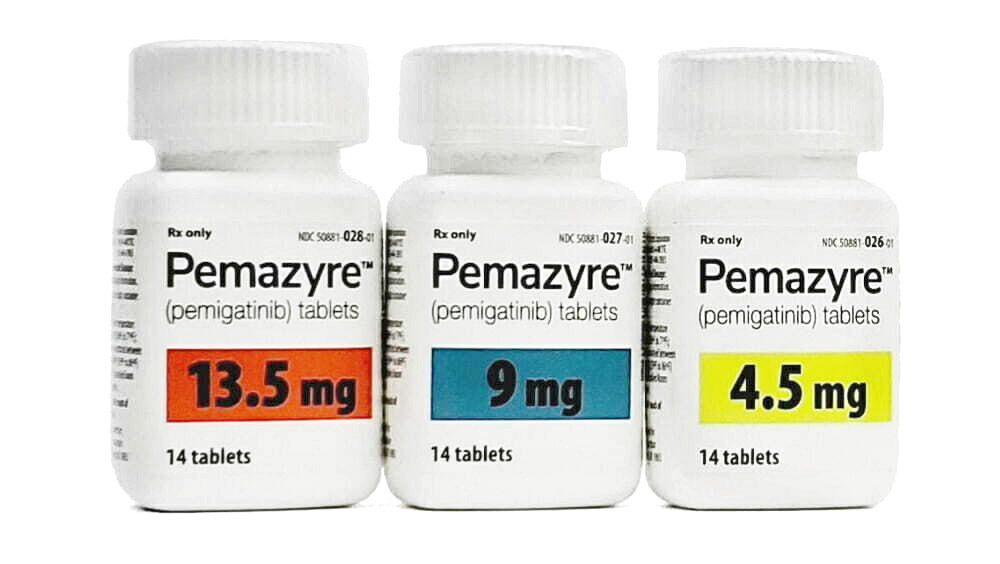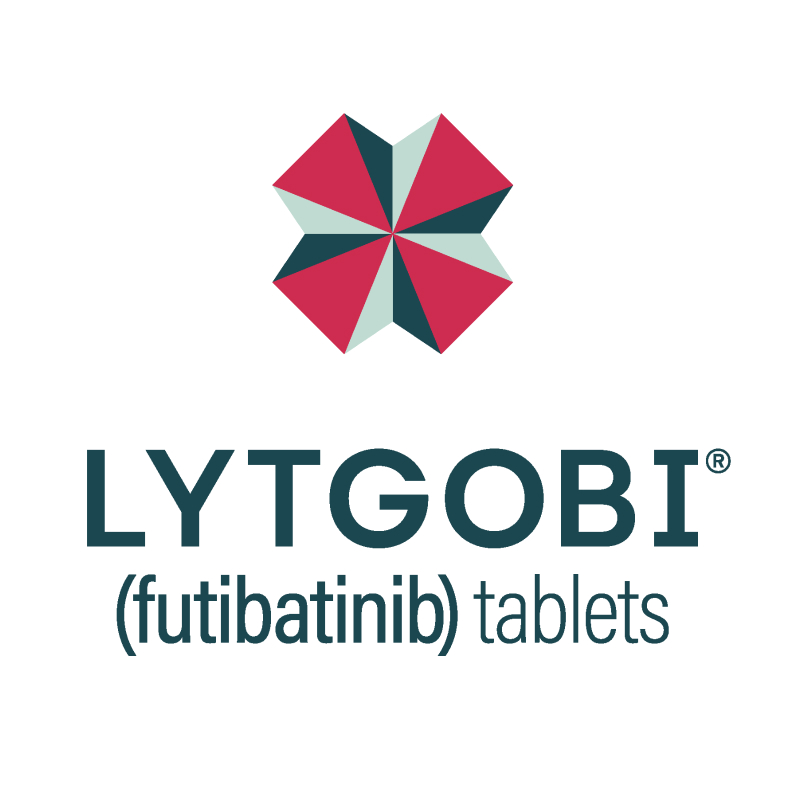Pemazyre (pemigatinib) vs Lytgobi (futibatinib)
Pemazyre (pemigatinib) vs Lytgobi (futibatinib)
Pemazyre (pemigatinib) and Lytgobi (futibatinib) are both oral kinase inhibitors used to treat certain types of cancer, but they target different genetic mutations and are approved for different indications. Pemazyre is specifically approved for the treatment of adults with previously treated, unresectable locally advanced or metastatic cholangiocarcinoma with a fibroblast growth factor receptor 2 (FGFR2) fusion or other rearrangement. In contrast, Lytgobi is approved for the treatment of adults with previously treated, unresectable, locally advanced or metastatic intrahepatic cholangiocarcinoma with a fibroblast growth factor receptor 2 (FGFR2) fusion or other rearrangement, providing an alternative option for patients with this specific genetic marker. The choice between these two medications would depend on the individual patient's specific type of cancer, genetic mutation, previous treatments, and overall health profile, and should be made in consultation with an oncologist.
Difference between Pemazyre and Lytgobi
| Metric | Pemazyre (pemigatinib) | Lytgobi (futibatinib) |
|---|---|---|
| Generic name | pemigatinib | futibatinib |
| Indications | Cholangiocarcinoma with FGFR2 fusions or rearrangements | Previously treated, unresectable, locally advanced or metastatic intrahepatic cholangiocarcinoma |
| Mechanism of action | FGFR1, FGFR2, and FGFR3 inhibitor | FGFR1-4 kinase inhibitor |
| Brand names | Pemazyre | Lytgobi |
| Administrative route | Oral | Oral |
| Side effects | Hyperphosphatemia, alopecia, diarrhea, fatigue | Hyperphosphatemia, stomatitis, fatigue, alopecia |
| Contraindications | Ocular toxicity risk; not recommended in patients with vision loss | None specifically noted; caution in patients with ocular or vision issues |
| Drug class | Kinase inhibitor | Kinase inhibitor |
| Manufacturer | Incite Corporation | Taiho Oncology, Inc. |
Efficacy
Pemazyre (pemigatinib) for Bile Duct Cancer
Pemazyre (pemigatinib) is a targeted therapy approved by the U.S. Food and Drug Administration (FDA) for the treatment of adults with previously treated, unresectable locally advanced or metastatic cholangiocarcinoma (bile duct cancer) with a fibroblast growth factor receptor 2 (FGFR2) fusion or other rearrangement as detected by an FDA-approved test. The efficacy of pemigatinib was demonstrated in the FIGHT-202 study, a multicenter, open-label, single-arm trial. In this trial, patients who received pemigatinib experienced a median progression-free survival of 6.9 months and an overall response rate (ORR) of 36%, with 2.8% achieving a complete response.
Lytgobi (futibatinib) for Bile Duct Cancer
Lytgobi (futibatinib) is another targeted therapy that has shown promise in treating bile duct cancer. Although at the time of writing, Lytgobi has not been approved by the FDA for any indication, it has been evaluated in clinical trials. In particular, the FOENIX-CCA2 trial has been assessing the efficacy of futibatinib in patients with advanced cholangiocarcinoma harboring FGFR2 gene rearrangements. Preliminary results from this trial have indicated that futibatinib has antitumor activity in patients with FGFR2 fusion-positive cholangiocarcinoma, suggesting potential as a treatment option for this patient population.
Both Pemazyre and Lytgobi are part of a class of drugs known as FGFR inhibitors. These drugs work by targeting and inhibiting the activity of FGFR, which can be abnormally active in certain types of cancer, including cholangiocarcinoma. By blocking this pathway, FGFR inhibitors can help to slow down or stop the growth of cancer cells. The presence of FGFR2 fusions or rearrangements in bile duct cancer cells is a key factor in determining the likelihood of response to these medications.
It is important to note that while these therapies have shown efficacy in clinical trials, their effectiveness can vary among individual patients. The decision to use these medications should be based on a comprehensive assessment by a healthcare provider, including the consideration of the specific molecular characteristics of the tumor, prior treatments, and the overall health status of the patient. As with all medications, the benefits of Pemazyre and Lytgobi must be weighed against the potential risks and side effects.
Regulatory Agency Approvals
Pemazyre
-
European Medical Agency (EMA), European Union

-
Food and Drug Administration (FDA), USA

-
Pharmaceuticals and Medical Devices Agency (PMDA), Japan

Lytgobi
-
European Medical Agency (EMA), European Union

-
Food and Drug Administration (FDA), USA

Access Pemazyre or Lytgobi today
If Pemazyre or Lytgobi are not approved or available in your country (e.g. due to supply issues), you can access them via Everyone.org.
How it works

Make an enquiry
Choose the medicine you want to buy, answer a couple of questions, and upload your prescription to speed things up. We’ll get back to you within 24 hours.


Make an enquiry
Choose the medicine you want to buy, answer a couple of questions, and upload your prescription to speed things up. We’ll get back to you within 24 hours.


Breeze through the paperwork
We'll guide you through the required documents for importing unapproved medicine, ensuring you have all the necessary information.


Get a personalized quote
We’ll prepare a quote for you, including medicine costs and any shipping, administrative, or import fees that may apply.


Receive your medicine
Accept the quote and we’ll handle the rest - sourcing and safely delivering your medicine.

Some text on this page has been automatically generated. Speak to your physician before you start a new treatment or medication.
Let's talk
If you have any questions, call us or send us a message through WhatsApp or email:
Contact us




